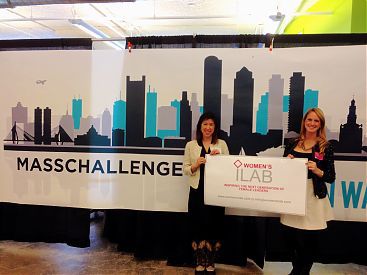MassChallenge, a business acceleration firm, announced separate partnerships with Women’s iLab and the Startup Institute, which together will provide small businesses and burgeoning female entrepreneurs with crucial industry resources to promote diversity within business start-ups, according to two respective press releases.

Women’s iLab is an online platform for women to share their thoughts and ideas, as well as develop their brands through dialogue with women working in their given field, said co-creator Tara Chang.
“We’re inspiring the next generation of female leaders, for them to really voice their opinions and speak about topics they care about,” Chang said.
Chang and co-founder Katrina Melesciuc started Women’s iLab in June 2014.
“Katrina and I initially created women’s iLab because we felt a void in the lack of female leadership,” Chang said. “We’ve always worked in the advertising and technology space, and we were seeking more influential mentors, and that’s why we originally founded Women’s iLab.”
In addition to public outreach, Women’s iLab has sponsored several seats in the upcoming MassChallenge program, the Feb. 13 release stated.
“We are going to offer several desks [to women] in our office at MassChallenge,” said Roman Kern, MassChallenge’s senior director of programs and operations in the area. “Our female partners will get the actual opportunity to interact with the MassChallenge community and see everything we have to offer.”
MassChallenge has tailored its program to include more women as featured speakers and on the admissions board, and it will provide the accepted entrepreneurs in mentorship, training, access to funding, legal advice and media outreach, Kern said.
With access to crucial financial and human connections, MassChallenge “help[s] underserved communities to get off the ground and start their own businesses,” Kern said.
Melesciuc said in order to incorporate the female perspective in a historically male-dominated business, support across gender lines is necessary.
“It’s not just about women supporting women. The idea is that male-led companies and male-led organizations will support more females in leadership and more female representation in their community,” Melesciuc said.
The Startup Institute’s instructional program, announced in a Tuesday press release, is working to get more women involved in high-growth companies and gain exposure to the entrepreneurial process, which Startup Institute Boston Vice President and Director Allan Telio said leads to more effective businesses and better product outcomes.
“If you have a company that is primarily a group of white males, you might be building a product with a white male perspective,” Telio said.
Citing a 2014 U.S. Senate Report, the release stated businesses that boast quality female leadership outperform their boys-club counterparts nearly threefold.
“Seeing the profitability there and the revenue that could exist, [the partnership] is not just good for women. It’s good for the overall economy,” Chang said.
Several residents said there is an importance in supporting female leadership through mentorship programs across business platforms.
Nikki Baldvins, 30, of Jamaica Plain, said professional women were instrumental to her in her career.
“For me, mentorships were everything,” she said. “I work for a structural engineering firm in downtown Boston where my manager is a woman, and most of the people who mentor me in my office are women. Having strong female role models in my office had made all the difference in my professional development.”
Nicole Wolf, 25, of Fenway, said women’s roles as homemakers can make it difficult for them to fulfill their professional aspirations.
“Right now, there are a lot of men in leadership positions, so of course, more diversity will only help things,” she said. “But you need a great, hardworking woman in leadership. You don’t just need a woman.”
Jack Brandwein, 57, of Back Bay, said female role models are essential to young women who want to enter the workforce.
“Half the population is female,” he said. “It’s important for there to be models for half the population that’s female. Otherwise, it appears that by dent of someone’s gender, they’re excluded from participation in management levels of the workforce.”














